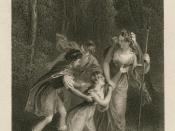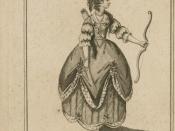Titus Andronicus is the most berated of Shakespeare's tragedies. All the debates of scholarship come into play whenever the authorship and value of this apprentice masterpiece are discussed (Cutts 59). In this essay I shall not attempt further to grace this debate but rather to state why William Shakespeare wrote this most controversial play, why it has survived for so long, what it means, and what it tries to convey to its audiences.
The authorship of this play is argued because Shakespeare borrowed a lot of the ideas from different stories and plays and apparently someone else had written the same story of Titus Andronicus some time before Shakespeare. He just borrowed it and made it better (Dowden 54). That allegation, however, has yet to be proved. Scholars list some of the sources for Titus to be Euripides' Hecuba, Seneca's Tyestes and Troades, and parts of Ovid and Plutarch (http://search.eb.com/shakespeare...).
Earlier I described the play as an 'apprentice masterpiece' in this respect: just as an apprentice carpenter of the period would prepare and create for himself a test piece, thereby attaining the final articles before becoming a fully fledged practitioner of his craft, so in much the same way Titus Andronicus was Shakespeare's test piece and template for all the great tragedies that were to follow - Lear, Othello, Hamlet, and Macbeth (Encarta, CD-ROM). Just as the apprentice would create a formula piece, such as an infant's high chair, so Shakespeare's formula was to write within the style and structure of the revenge drama of the time. Performing within this structure one becomes increasingly aware of the genius of the writer (Dowden 58). The apprentice carpenter server his master, but Shakespeare is his own apprentice and his own master. The disciplines he has created for himself are the disciplines which...


